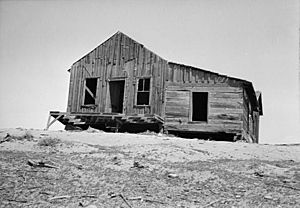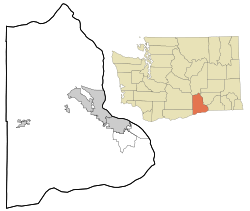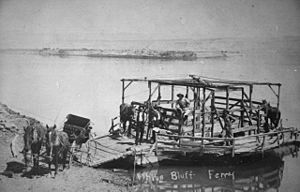White Bluffs, Washington facts for kids
Quick facts for kids
White Bluffs, Washington
|
|
|---|---|

Remains of the Hudson's Bay Company post at White Bluffs, ca. 1937
|
|
| Country | United States |
| State | Washington |
| County | Benton |
| Elevation | 413 ft (126 m) |
| Time zone | UTC-8 (Pacific (PST)) |
| • Summer (DST) | UTC-7 (PDT) |
| ZIP code |
98944
|
| Area code(s) | 509 |
| GNIS feature ID | 1531180 |
White Bluffs was a small farming town in Benton County, Washington, United States. It was a busy place where people grew fruits and vegetables. But in 1943, the town had to close down. This happened because the land was needed for a secret project. This project was a nuclear production site called the Hanford Site. The nearby town of Hanford was also closed for the same reason.
History of White Bluffs
Before people from Europe settled here, the land belonged to the Wanapum Indians. They were a Native American tribe. They were closely related to other tribes like the Palouse, Yakama, and Nez Perce tribes.
The first European settlers arrived in White Bluffs in 1861. The original town was on the east side of the Columbia River. This area is now part of Franklin County. It was close to what is now called Area 100H of the Hanford Nuclear Reservation.
A ferry was built to help people cross the Columbia River. Many people were heading to British Columbia for the gold rush. By the early 1890s, more people had moved to White Bluffs. The town then grew to include the west side of the Columbia River in Benton County.
In 1921, the state government planned a project to build 99 homes. These homes were for soldiers who had returned from World War I. However, this project was stopped in 1925.
The Hanford Site Project
In March 1943, the U.S. government took over the homes of White Bluffs residents. Some homes were immediately used as government offices. People were given only a few days or up to two months to leave their homes.
To clear the land for the new facility, homes and orchards were burned by the government. The remains of about 177 people buried in the White Bluffs Cemetery were moved. On May 6, 1943, they were reburied in the East Prosser Cemetery, about 30 miles (50 km) away.
When the government took over White Bluffs, the town's main income came from farming. People grew pears, apples, vegetables, and grapes for making wine.
Today, almost nothing is left of the original town. The U.S. Department of Energy released a collection of photos of White Bluffs on June 15, 2008.
See also
 In Spanish: White Bluffs (Washington) para niños
In Spanish: White Bluffs (Washington) para niños
 | Jewel Prestage |
 | Ella Baker |
 | Fannie Lou Hamer |



